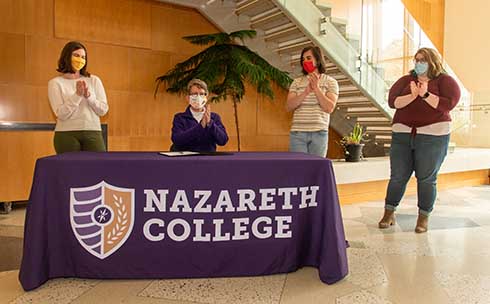President Paul Signs the Higher Education Carbon Pricing Endorsement
Nazareth College's Environmental Sustainability Club is part of the national campaign titled "Put a Price on it," which is an effort to put a price on carbon. Carbon pricing makes clear the costs of carbon emissions, ties the damage back to its sources, and creates a powerful incentive for individuals, communities, investors, and businesses to reduce greenhouse gas emissions and transition to a clean energy economy.
Nazareth students, faculty, and staff have worked with The Citizens' Climate Lobby for more than a year, and President Beth Paul demonstrated her support for carbon pricing by signing an endorsement letter on April 21 in Peckham Hall. It is part of a week-long series of Earth Day events at Nazareth College.
"The Environmental Sustainability Club is excited for President Paul to sign the Higher Education Carbon Pricing Endorsement," said student Emma Cuffney, a club member. "Our Nazareth community will join a group of universities that value leadership, innovation, and investment in this important part of our future."
A strong, economy-wide price on carbon could reduce America's carbon pollution by as much as 30% in the first 5 years alone. The endorsement is for a climate solution that allows for flexibility in the way carbon pricing is implemented. The endorsement letters are shared with members of Congress and the higher education community.
Endorsement Letter
As leaders of higher education institutions, we call upon our elected representatives to act collectively on behalf of current and future generations by putting a price on carbon. We work to prepare our students for thriving futures, over which climate change casts a dark shadow of uncertainty. Putting a price on carbon pollution is an indispensable step we can take to effectively combat climate change.
Carbon pricing creates an economy-wide incentive to reduce greenhouse gases in economically efficient ways that can, if revenues are used wisely, benefit low-income households while stimulating job growth. The World Bank has endorsed carbon pricing as a way to accurately account for the external costs of emissions, like crop loss, flood damage, and medical treatments that result from heat waves and other climate change disasters. Thousands of businesses support carbon pricing for its transparent and predictable approach.
Dozens of countries and jurisdictions across the world have already enacted carbon pricing mechanisms, and the evidence is in: carbon pricing enables renewable energy to flourish, helps phase out polluting energy sources, and lowers emissions. A strong carbon price will rise quickly enough to work without burdening low-income and middle-class families, and won't create new dependencies on profits from carbon-based energy.
It is time for the United States to lead on this defining issue of our time, and protect the health and well-being of current and future generations. By making carbon-intensive industries pay a fair share of the costs of their pollution, we will have cleaner air and healthier communities, and prevent the most devastating effects of climate change. We therefore ask our elected officials to proactively work to enact a carbon price on the state and national level.
Read more about the Higher Education Carbon Pricing Endorsement Initiative.
Contact
Julie Long | Chief PR Officer | jlong2@naz.edu | (585) 289-2456 | (585-781-8186 (cell)
Nazareth University is an inclusive community of inspired learners, educators, and changemakers who for 100 years have been driven by a bold commitment to action, empathy, equity, and leading innovation for the common good. Impact experiences are at the heart of a Nazareth education, preparing each student to discover within themselves the potential to cultivate positive change in their life's work, in any career field, and in a world that is constantly evolving and infinitely interconnected.
Our broad academic offerings present a range of study options typical of larger universities, yet achieved in our supportive campus culture. Nearly 2,100 undergrad and 600 graduate students enroll in degree and certificate programs and engage in collaborative, transformative learning experiences, preparing for the professions and society of today and tomorrow. In a learning community that purposefully integrates liberal arts and professional programs, Nazareth University graduates are able to launch a lifetime of impactful leadership in communities and workplaces near and far.

Nazareth student members of the Environmental Sustainability Club Emma Cuffney (L to R), Matt Corona, and Emma Currie applaud with President Beth Paul (seated) after she signed the carbon pricing endorsement letter.